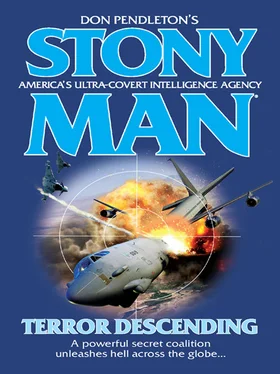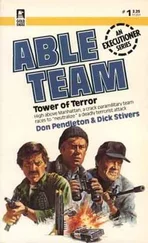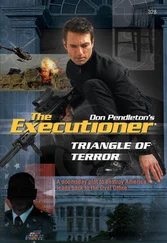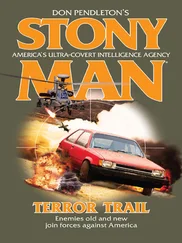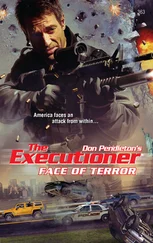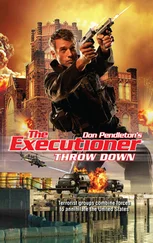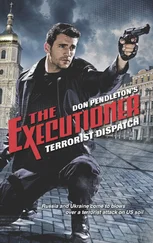“No, I’m going back to the plane,” McCarter countered, already in motion. “You stay with our friend in the hills, and don’t lose him! Keep with him at all costs.”
Confused, Manning narrowed his eyes in annoyance, then realized that if there was any trouble, a Barrett was the only weapon that stood a chance against another Barrett. Accepting the inevitable, Manning broke into a sprint, heading deeper into the desert to approach them from the side as the Cessna lifted off the ground and McCarter disappeared behind the sand dunes.
Gradually, the sounds of the engine and boots faded into the distance, and the desert airfield was still once more, the cooling corpses illuminated by the moon and the crackling blaze in the ruined garage.
Patagonia Desert
A cold wind blew across the frozen land, carrying away the last vestiges of heat. Pristine white snow frosted the ground and the small lake was a solid sheet of ice. Along the curve of the horizon, rough mountains rose in jagged peaks as if they were new and not yet completely finished. Majestic condors flew among the craggy tors, forever on the hunt for anything edible.
Standing near the edge of a cliff, a woman in a brightly colored parka was setting a camera onto a tripod when she heard the crunch of snow under boots. Out there? A stranger was approaching from the direction of an old jeep, the heat visibly radiating from the engine.
“Hello,” she said hesitantly, a hand going into a pocket to touch her cell phone.
“Goodbye,” the man replied, raising a gloved hand and firing.
Hidden inside the glove, a silenced .22 Remington snapped off six fast shots, the tiny bullets almost leaving through the same hole in the quilted material.
Recoiling as if hit by sledgehammers, the woman staggered away from the camera, blood gushing from her ragged throat. Clutching the ghastly wounds with her own gloved hands, she tried to yell and only managed a rough cough, warm red fluids filling her mouth to spill over her lips and down the front of her insulated parka.
Reaching the edge of the cliff, the woman suddenly realized her location and started away from the abyss. Craig Rexton shot her twice more, then kicked the photographer in the stomach. Air and blood exploded from her mouth, and the dying woman went sailing over the cliff. It seemed to take her an inordinate length of time to disappear into the misty darkness, but, then, it was more than nine hundred feet to the base of the cliff.
Grunting at the sight of the messy impact below, Rexton nodded in satisfaction, then began to toss the woman’s boxes of supplies over the cliff. Especially that damn camera. He was not overly familiar with the model, and cracked the plastic shell getting to the film, which he exposed to the weak sunlight.
Producing a grenade from his parka, Rexton pulled the arming pin, released the handle and then threw the grenade down the cliff. He turned and raced for the Jeep, and was about halfway there when the bomb detonated. Done and done. If anybody ever found the body, which was highly unlikely, there was nothing to connect the death to his people.
And certainly not in enough time to do anything. Rexton smirked. It was a pity there were no wild predators in the vicinity. But then, nothing was perfect.
Visitors to Patagonia were few and very far between. Wanted by nobody, but claimed by both Chile and Argentina purely for political reasons, Patagonia was rife with impossibly steep mountains, live volcanoes, molten lava, acrid deserts and glaciers larger than most cities, making it the most inhospitable land on the planet. There were no native inhabitants, no outposts nor even roads. Most people called Patagonia the edge of the world.
It was early spring and the yearly thaw had not yet begun to release the long winter’s accumulation of snow and ice. Even the waterfall extending from the side of a granite cliff was still a solid mass that reached straight down to the barren shoreline of smooth rocks. Aside from the condors, nothing moved, even the clouds seemed quiescent.
For now, Patagonia was a desolate world of bitter cold and black rocks, void of any useful minerals, ores or even natural beauty. It was a vast and sterile land of no conceivable use to anything or anybody.
Aside from the paramilitary group known as Genesis.
Entrenched just to the south of the dried mud lake was a flat expanse of gleaming white concrete. Set off safely to the side was a series of massive fuel tanks, and on the opposite side of the airfield were several concrete bunkers, the rooftops bristling with radar, optical scanners, dish microphones, squat Vulcan miniguns and SAM launchers. An acre of strong canvas stretched between two outcroppings covered several B-52 bombers parked on the ground. One was partially disassembled, and another had been reduced to a mere skeleton, every salvageable part already removed, but the others were in perfect condition, the fuselages gleaming with fresh paint, their bomb bays heavy with deadly cargo.
Encircling the entire airfield was a double row of burnished steel rods that hummed softly whenever a condor flew overhead or a leaf fluttered past the finely tuned proximity sensors. Buried between the rows were land mines of every conceivable type, some automatic, others remotely controlled. Many of them were linked together. There was no gate or access road. The only way to reach the base on land was through the mines. Setting off one would cause a score of others to detonate, spreading a wave of destruction that would herald a corona of deadly shrapnel. Some mines were hidden outside the row of sensors, an additional trap for any possible invaders foolhardy enough to risk approaching the somber headquarters for Genesis.
Jouncing over the irregular terrain, Rexton held tightly on to the steering wheel, the hood of his parka flipping backward to reveal his starkly handsome features. The man looked like an aging movie star using plastic surgery to hold on to the last few years of beauty, but that was merely his natural countenance. The plastic surgery would come later, after the fall of America.
As the vehicle came into visible sight of the base, the weapons on top of the bunkers instantly locked on to the moving target, the multiple barrels of the Vulcans automatically spinning to a blur as they prepared to fire.
Heading for the bunkers, Rexton touched an electronic device strapped to his wrist and the Vulcans promptly powered down and returned to their ready status.
Knowing that any variation in speed would trigger the live mines, the man maintained a steady course through the defensive barrier and safely reached the other side without undue incident. He barked a laugh at that as if gaining access to the base was some sort of minor victory.
Passing a low dome barely visible above the ground, Rexton waved in greeting to the armed guards inside the kiosk. A thin layer of concrete covered the muzzles of the old German 88 cannons, and anybody who did not wave, with the left hand only, was killed on sight. Some of his people complained about all of the complex security regulations, but the leader of Genesis was fully aware of what sort of violent countermeasures the brutal American government would take if it ever learned who was behind the bombings of the major airports. They had to be ready at all times for a full-scale invasion, both from above and from the ground. At least they were safe from the river, as it was frozen solid for most of the year, and even when warm, it was hardly of sufficient depth for the U.S. Navy to send in an attack submarine or even a squad a SEALs.
No, the base was secure, the terrorist noted mentally. We’re well protected in every direction. Genesis would be safe here, until the coming war was over, and sanity finally returned to the world.
Читать дальше
